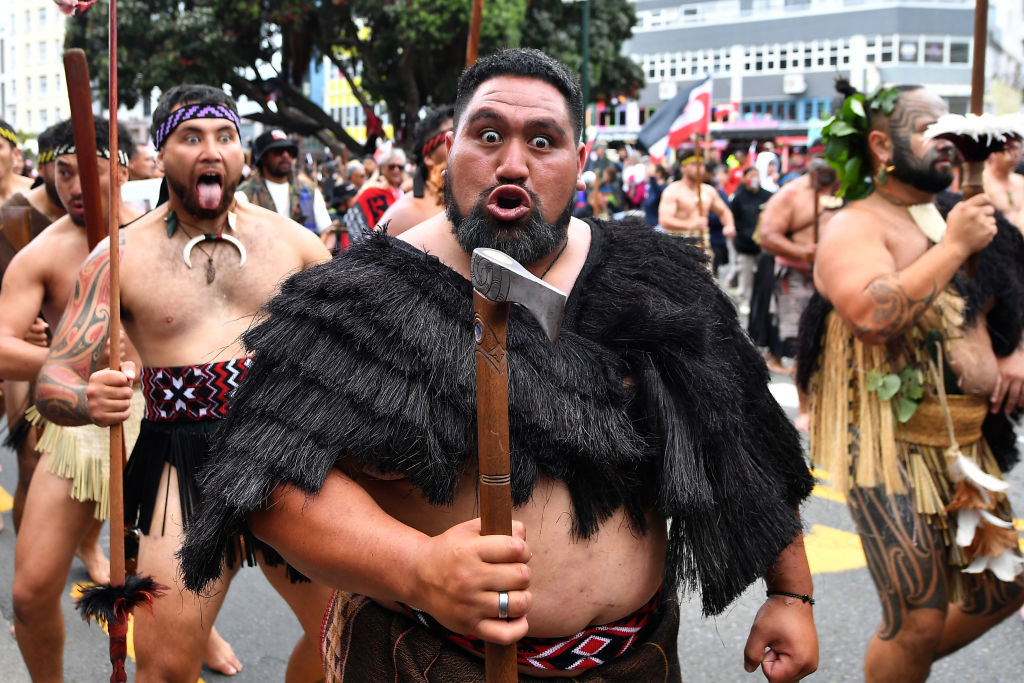Last week, a video went viral of Maori politicians in the New Zealand Parliament performing a silly piece of political theatre. In protest against a proposed bill that would revise the terms of the 184-year-old Treaty of Waitangi, which makes unique allowances for Maori people in exchange for British rule, MPs tore up copies of the bill and did a traditional haka dance in defiance. The politician who proposed the bill, David Seymour of the libertarian ACT party, argued it went against the principle of equality in favour of special group rights. This week, more than 40,000 protestors demonstrated in Wellington against the bill.
The premise of the treaty presumes that New Zealand is a binational state composed of a white Anglo-settler community — which, due to recent waves of mass immigration, has become much more multi-ethnic — and an indigenous Maori community. The Maori are a confederation of various tribes who have to share sovereignty with each other, especially over land rights and political representation.
Some on the very online Right have mocked Maori protests as an odd show of ethnonationalism. There is clearly some truth to this claim. A lot of indigenous rights activism is premised on romantic notions that people like the Maori are noble savages who have a “unique” way of life and relationship with “the land” by dint of their ancestry that ought to be recognised and preserved by the state. As Hana-Rawhiti Maipi-Clarke, the MP who led the protests, stated in a recent rally: “We are the kingmakers and the sovereign people of this land”. But those on the Right aren’t objecting out of any honest liberal principle. Their opposition is pure hypocrisy: it is simply because it is against their ethno-national group (white Anglos).
The concept of “indigeneity”, which has been trendy among some parts of the Left, post-colonial academia and decolonial activists for some years, has become toxic. Both sides in the Israel-Palestine conflict use this rhetoric as the basis for their people being the “true” proprietors of the Holy Land and it has legitimised a racial war mindset. Its use has allowed for racial essentialism and outright racism for a generation. It is simply reactionary, as it posits that particular pieces of land “belong” to a particular volk, and a particular volk “belong” to a piece of land because of a supposedly unique ancestral-spiritual connection only they have. This notion, it mustn’t be forgotten, was key to proto-fascist nationalist movements in the 19th and 20th centuries.
It is no surprise that the proponents of the Great Replacement Theory and the French New Right have long appropriated Left-sounding phrases to rebrand their racism as “ethnopluralism”. This idea, almost acceptable in our times of multiculturalism, suggests that each group should have its unique and ancient heritage preserved against global capitalism and liberalism which are nefariously diluting them through mass immigration and globalisation. Here, you can see ethnonationalists adopting the tone of victimised minorities by claiming that “indigeneity” is sacred.
The Maori protests have revealed the strangely unthinking currents on both extremities of the political aisle. One’s liberty and sense of belonging to a land does not and should not depend on “racial” ancestry or an ethnocentric understanding of sovereignty, but on the simple fact of being human.











Join the discussion
Join like minded readers that support our journalism by becoming a paid subscriber
To join the discussion in the comments, become a paid subscriber.
Join like minded readers that support our journalism, read unlimited articles and enjoy other subscriber-only benefits.
Subscribe